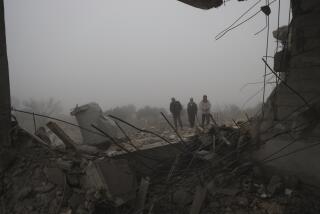Iraq-Iran talks on security ‘positive’
BAGHDAD — An Iraqi delegation that traveled to Iran to confront it with allegations of involvement in Iraqi violence returned Saturday saying it had secured an agreement to “stabilize security” and improve cooperation.
The statements were in stark contrast to the harsh words Iraqi officials had last week for Iran. Those included allegations that Iranian-made weapons with manufacture dates of 2008 had been found in the southern city of Basra in the wake of recent clashes between Shiite Muslim militiamen and Iraqi and U.S. security forces.
The purported finds, which have not been shown to the public, would prove that Iran had broken a commitment to Prime Minister Nouri Maliki last year to help cut off weapons, funding and other support for militants.
U.S. military officials have portrayed the purported Basra caches as an “eye-opener” for Iraqi leaders, providing Baghdad the evidence it needed to confront Iran. Tehran denies accusations of involvement in Iraq’s violence. An Iranian Foreign Ministry spokesman, Mohammed Ali Hosseini, told The Times in a telephone interview last week that Iran welcomed the Iraqi delegation “and wants to stop the violence in Iraq.”
Khalid Attiya, deputy speaker of Iraq’s parliament, said the five-member delegation “sensed a positive stance” from Iranian officials. “The two sides have agreed to keep up efforts to stabilize security,” he said.
Attiya made no mention of the recent accusations by the U.S. government, charges that the Pentagon has been leveling for years. U.S. military and political officials have been more vocal about the allegations since late March, when Maliki launched the Basra offensive against Shiite militias.
The United States blames much of the fighting since the offensive on Iranian-backed extremists. Iran says the United States is using it as a scapegoat for its problems in Iraq.
The heightened tensions have put Iraq in an uncomfortable position as it is pressured by Washington to be more aggressive toward Iran, with which it shares a long border and has strong economic and religious ties. Iraq’s main Shiite group, the powerful Supreme Islamic Iraqi Council, is allied with Maliki’s Islamic Dawa Party and with the United States, but it also has close ties to Tehran.
The group’s chief advisor in Iran, Mohsen Hakim, refused to discuss the allegations against Iran in an interview Saturday, saying there was “no official declaration about that from the Iraqi government.”
“Look, the disputes between Iran and the United States are not new,” Hakim said when asked to speculate on the reason for the Pentagon’s renewed allegations against Iran. He said any problems between Iran and the United States should be settled through negotiations, echoing Iraqi officials’ comments last week that appeared aimed at getting Washington to tone down its rhetoric.
“All over the region . . . there is a worry about tensions between Iran and the U.S.,” he said. “You can call it tension, crisis, or war, whatever. Everybody in the region is worried.”
In the latest violence in Iraq, the U.S. military announced early today that four Marines had been killed in western Anbar province in a bomb blast. The brief announcement said the deaths occurred Friday. At least 4,066 U.S. forces have died in Iraq since the war began in March 2003, not including the latest deaths, according to icasualties.org.
On Saturday, the U.S. military sent a guided missile slamming into a building in the heart of Sadr City, the cleric’s Baghdad stronghold. The military said the building was a command center used by militiamen to coordinate attacks on U.S. and Iraqi soldiers and civilians.
But it was next to a hospital parking lot, and hospital officials said at least 28 people were injured and 11 ambulances damaged by debris from the blast.
--
--
Times staff writer Susman reported from Baghdad and special correspondent Mostaghim from Tehran. Times staff writer Raheem Salman and a special correspondent in Baghdad contributed to this report.
More to Read
Sign up for Essential California
The most important California stories and recommendations in your inbox every morning.
You may occasionally receive promotional content from the Los Angeles Times.










